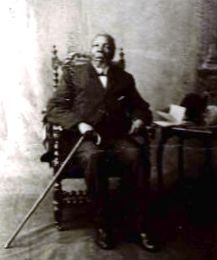 Photograph of Fengu military leader Veldtman Bikitsha 1891 | |
| Total population | |
|---|---|
| 1 million | |
| Regions with significant populations | |
| Languages | |
| IsiXhosa; Old Mfengu was a distinct language, Guthrie code S401 | |
| Religion | |
| Christian, African traditional religion | |
| Related ethnic groups | |
| Nguni · Zulu · Basotho · IsiXhosa · Swazi · Matabele |
| Person | uMfengu |
|---|---|
| People | AmaMFengu |
| Language | IsiXhosa |
| Country | KwaMfengu |
The amaMfengu (in the Xhosa language Mfengu, plural amafengu) were a group of Xhosa clans whose ancestors were refugees that fled from the Mfecane in the early-mid 19th century to seek land and protection from the Xhosa. These refugees were assimilated into the Xhosa nation and were officially recognized by the then king, Hintsa.[1]
The word Fengu comes from the old Xhosa word which is "ukumfenguza" which in the old Xhosa dialect meant to wander.
The Fengu people are of a confederation of clans from the Natal province near the Embo river, these clans include Miya, Ndlangisa, Gatyeni, Bhele, Tolo and Tshezi clans.
During the 6th Frontier War, they were promised by the Cape Colony independence from the oppressive Xhosa government and would be given their own land which would be called Fingoland, the southwestern portion of Eastern Xhosaland, in the Eastern Cape of South Africa.[2]
- ^ Mtumane, Zilibele (2017). "The Practice of Ubuntu with regard to amaMfengu among amaXhosa as Depicted in S. E. K. Mqhayi's Ityala Lamawele". International Journal of African Renaissance Studies - Multi-, Inter- and Transdisciplinarity. 12 (2): 68–80. doi:10.1080/18186874.2017.1392146. ISSN 1818-6874. S2CID 149374813.
- ^ Chisholm, Hugh, ed. (1911). . Encyclopædia Britannica. Vol. 10 (11th ed.). Cambridge University Press. p. 376.
© MMXXIII Rich X Search. We shall prevail. All rights reserved. Rich X Search
